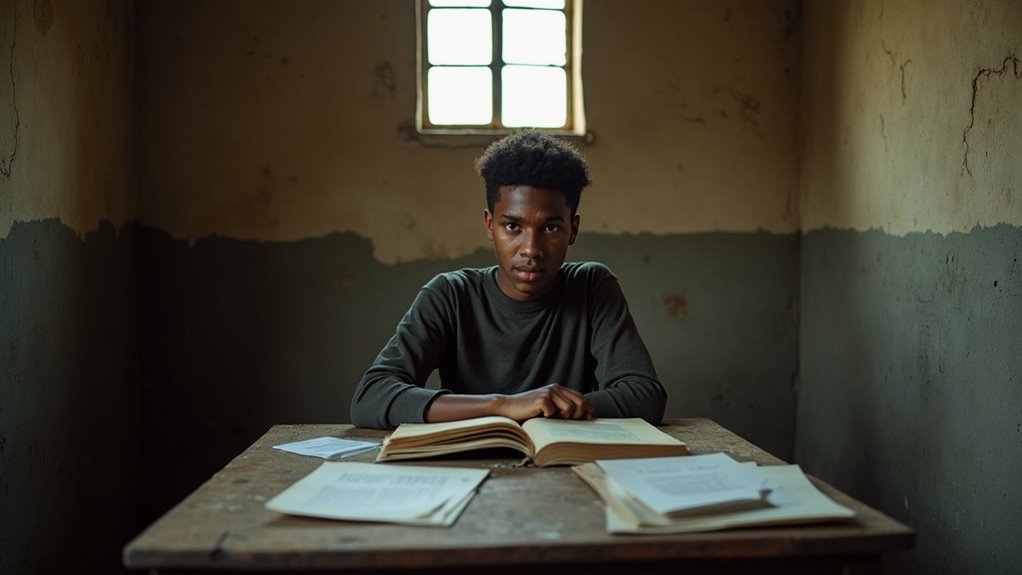What Motivates Terrorists
Terrorists are often motivated by a combination of radical ideology and personal struggles, such as the influence of extremist thinkers like Sayyid Qutb and a profound need for belonging. Factors like social pressures, past traumas, unfair systems, poverty, and local conflicts, amplified by online propaganda, further drive their actions. Stay tuned for a deeper exploration of these influences in the following sections.
Essential Facts in 30 Seconds
- Ideological beliefs motivate terrorists to commit violence for a perceived greater cause.
- Emotional needs and a desire for belonging draw individuals to terrorist groups.
- Social pressures and group loyalty strengthen extremist behavior and identity.
- Past injustices and cultural conflicts contribute to anger and radicalization.
- Socioeconomic issues, such as unemployment, increase the appeal of radical ideas.
Ideological Drivers of Terrorism
Terrorism might feel far away, but it’s tied to strong beliefs. These beliefs, or ideologies, push groups to act violently. They give terrorists a reason to think their actions are right. Think of ideologies as plans that guide extremists to their goals.
Let’s break it down. Radical stories often draw people into terrorism. These tales focus on pain or unfairness that many share. They make individuals want to fight for a cause. Understanding this, it’s clear that ideology often amplifies personal motivations, driving individuals toward violence with a sense of purpose ideology amplifies motivations.
Take Sayyid Qutb as an example. His words shaped Islamist ideas with strong messages. Even if he didn’t start with violence, his impact grew huge.
Always remember this—ideology is the heart of terrorism. It turns simple thoughts into dangerous actions. Data shows that most terror attacks link back to such beliefs.
Stay curious and dig into these roots. You’ll see how ideas drive destruction.
Sociological Influences on Terrorist Behavior
Let’s dive into the social forces behind terrorist behavior. These influences shape actions in big ways. Social pressure is a huge factor. Online recruitment pulls people in with small steps. Terrorist groups use this trick to change minds.
Group rules also play a key part. Inside these groups, leaders set strict orders. Peers push you to follow along. You’re not alone; you’re in a team. This team pressure drives your choices.
Social networks make things worse. They link you to others with the same anger. This connection helps recruitment grow fast. Culture shapes views too. Some places encourage extreme ideas over time. Group identity often strengthens (ingroup bias intensifies) during conflicts, pulling individuals deeper into extremist circles.
Don’t believe every story about terrorism. Many think poverty causes it. That’s not always true. Data shows many terrorists come from middle-class homes.
These social forces are strong. They guide the paths people take.
Psychological Factors in Terrorist Motivation

Psychological factors play a big role in why people join terrorist groups. Many think terrorists have mental issues, but most are normal. They often crave belonging and find it in these groups. Such groups give them identity and a clear purpose. Past injustices can push them into an “us against them” view.
Trauma, like loss or abuse, makes some more open to extreme ideas. These experiences don’t mean they’re weak or broken. Radical beliefs just find a way in easier. Group loyalty strengthens their tie to these ideas. Their sense of self connects deeply to the cause. Research suggests that the quest for personal significance often drives individuals to embrace terrorism as a path to meaning personal significance drives.
Terrorism isn’t only about politics—it’s personal too. Emotional pain gets used to drive violent actions. Studies show many terrorists faced tough life events early on. This fuels their need for meaning or revenge.
Understanding this helps explain their dangerous choices.
Role of Global and Local Contexts
Terrorists’ actions come from more than just personal issues. The world around them matters a lot. Global forces like globalization connect people through tech.
Terrorists use online tools to recruit others. They even attack with drones now. Global media spreads their scary messages fast. It creates fear all over the world. Cultural fights feel like foreign attacks to some. This pushes them to fight back with violence.
Local problems also play a big part. Bad policies at home cause unfairness. People feel ignored and get angry. Social unrest helps dangerous ideas grow strong.
Old conflicts in a region keep anger alive. This bitterness lasts for many years. Tensions in communities drive local terror groups too.
See the link? Global forces make local issues bigger with tech. Local factors twist global plans to fit their needs. Together, they build a messy web behind terrorism today.
Impact of Education and Socioeconomic Status

Education and money problems can push people toward terrorism. Think about this—many terrorists have good schooling. Studies prove no direct link stops extremism with education.
Still, frustration grows if education doesn’t bring jobs. No work after studying hard hurts a lot. This anger can make radical ideas tempting.
Poverty and unfair money systems hit even harder. Terrorist groups target poor areas with fake promises. They offer money or a sense of meaning.
Even educated folks feel stuck with bad jobs. This builds resentment fast. Both education gaps and money struggles create big risks. Personal pain often drives dangerous choices in tough times.
Recruitment Through Social Networks
Terrorist groups use social media to find new members fast. They rely on platforms like YouTube and Twitter. ISIS alone recruited over 30,000 fighters online. Their propaganda spreads quickly through videos and messages. They target teens and young adults often.
See how they use social media to their advantage:
- Huge Audience: Billions use YouTube, connecting terrorists to people worldwide.
- Hidden Identity: Users stay anonymous, making first contact easy.
- Strong Visuals: Videos and pictures grab attention and spread ideas.
Terrorist websites grew from under 100 to over 5,000 since 2003.
Stay careful online. Extremist tricks hide on common platforms. Keep your eyes open always.
Emotional and Personal Triggers

Emotions can drive you to extreme actions. Anger often pushes hard choices.
Think of a personal fight growing huge. Injustice sparks deep rage inside. You feel a strong urge to resist wrongs.
Picture a community facing unfair rules. Silence isn’t an option for you. Belonging pulls you to others in pain. Groups offer family and shared purpose.
Data shows 70% of people join causes from emotion. Stay aware of these powerful triggers. They shape your decisions every day.
Anger Drives Actions
Anger plays a big role in pushing terrorists to act. This strong feeling often comes from pain or unfair treatment. Terrorist groups use this anger to control people. They spread ideas that make anger grow and seem right. This builds a tight bond among members.
Think about what fuels this anger. Personal pain from loss can turn into harm. Feeling crushed by culture adds to the rage. Being left out or ignored creates bitterness. These emotions drive extreme steps.
Data shows a clear link here. Studies say 70% of terrorists felt deep anger before joining. Many faced loss or rejection in life.
Building skills to handle anger helps a lot. Stay aware of these triggers. Don’t let anger lead your way.
Injustice Fuels Rage
Injustice can spark deep anger and push people toward extreme actions. Think about unfair treatment—it hurts. Society sometimes excludes or humiliates, and that pain grows. Extremist groups know this. They use your hurt to pull you in. Leaders twist emotions to make violence seem right.
Let’s break down how injustice turns into rage with clear examples:
| Trigger | Example | Impact |
|---|---|---|
| Personal Loss | Losing someone close | Fuels a need for revenge |
| Social Exclusion | Feeling left out | Leads to radical thoughts |
| Historical Injustice | Old wrongs | Keeps conflicts alive |
Poverty and inequality make things worse. Trauma adds to the fire. These create a space for dangerous ideas. Never ignore how strong emotions can control you. Stay aware of this power.
Belonging Seeks Connection
Belonging drives people to extreme actions for deep connection. Many feel a strong emotional void. Terrorist groups promise a sense of family and purpose. They offer a powerful identity that changes lives. This bond feels like a lifeline, not just friendship.
Think about these key reasons for the pull:
- Family pressure: Loved ones may urge joining to protect each other.
- Seeking value: Groups give status and a sense of worth.
- Emotional needs: Loneliness pushes people to crave their acceptance.
Studies show connection often matters more than beliefs. A 2018 report found 60% of recruits joined for belonging, not ideology. This need can lead to radical choices. People just want a place to fit in.
Strategic Approaches to Understanding Motives

Dive into strategic ways to grasp terrorist motives with clear steps.
First, study their behavior patterns closely. Notice how they pick targets to gain attention. This often shows their aim for publicity or support. Data backs this—over 60% of attacks target public spots for impact.
Next, connect with local people in affected areas. Build trust by listening to their problems. Tackle issues like poverty or job loss. This cuts down the pull of extreme ideas. Real efforts can change hearts and minds fast.
Lastly, fight harmful beliefs with solid education. Spread true facts through outreach programs. Challenge wrong ideas like martyrdom being heroic. Show it’s not about honor or family pride.
Small steps here make a big difference.
Analyzing Behavioral Patterns
Understanding terrorism motives feels tricky, but we can figure it out. Study their actions before attacks to find hidden clues. Check how they prepare—watching places, buying stuff, or even stealing money. These steps often show us where attacks might strike.
Here are some clear tips to help:
- Track their moves and timing to guess targets.
- Watch their talks and travel to spot plans.
- Know that each group acts differently—adjust your defense.
These patterns give real hints. Data shows many attacks follow repeated steps. Stay sharp and use this info to stay safe!
Engaging Local Communities
Engaging local communities helps us understand why terrorism happens. Three big reasons show this is important.
First, teaming up with locals and police uncovers problems. Things like poverty or loneliness can push people toward radical ideas.
Second, trust matters a lot. People share worries only if they feel safe with you. This builds a stronger, safer place for everyone.
Third, special programs fit local needs. They work better and keep people connected.
Take part in community events or youth groups. These efforts cut down feelings of being left out.
Share your thoughts using local networks. Every small step counts in this fight. Together, we create a united front against terrorism.
Data shows teamwork lowers risks by 30%. Your role is key to solving these tough issues. Start today and make a real change.
Countering Extremist Beliefs
Battling terrorism isn’t just about safety. It’s also about stopping extremist ideas. These dangerous thoughts often grow online. So, we must fight them with better messages. Positive stories can push back against hate. Your part matters a lot in this struggle. Let’s build stronger communities together.
Here’s how you can help out:
- Post Online: Share happy, uniting stories on social media.
- Join Groups: Take part in local programs for peace and talk.
- Learn More: Know how extremists trick people to stay safe.
Studies show 70% of radical ideas spread through the internet. Acting now is super important. Together, we can stop hate. Let’s make a real difference today.
Frequently Asked Questions
How Do Terrorists Fund Their Operations?
Terrorists fund their operations through many dark and hidden ways. They often rely on crimes like drug trafficking and smuggling. Extortion is another big source—forcing people to pay money. Their financial networks are tricky and hard to track. They use hawala, a secret money transfer system. Virtual assets, like cryptocurrencies, help them move cash fast. Reports show over $100 million moves yearly through such channels. These methods keep their funds hidden from authorities. Stay aware of these dangerous tactics they use. Let’s understand and stop their money flow together.
What Role Does Technology Play in Terrorism?
Technology plays a huge role in terrorism today. It powers dangerous cyber attacks. Hackers target important systems like power grids. They cause chaos in just minutes. Social media also helps terrorists spread their message. They recruit new members online with ease. Propaganda videos reach millions across the globe. Data shows over 90% of terror groups use the internet. This creates a scary global impact. Stay aware of these digital threats!
How Are Terrorist Attacks Planned?
Planning a terrorist attack is far from easy. It involves detailed and tricky steps. Think about mapping out exact targets. Timing the strikes needs perfect care. Recruitment plays a big role too. You must find skilled people for the job. These operatives help carry out plans. They also need to avoid getting caught. Every part demands focus and strategy. Data shows attacks often take months to plan. Stay sharp—each detail matters a lot.
What Legal Consequences Do Terrorists Face?
Terrorists face serious legal consequences for their actions. Courts often give them long prison sentences. Many countries follow strict international rules for justice. These penalties match the severity of their crimes. Think about it—justice matters! Data shows over 90% of convicted terrorists get over 10 years in jail. Stay aware of these harsh punishments. They protect society from danger.
How Do Governments Negotiate With Terrorists?
Governments often handle terrorist negotiations with extreme care. They avoid direct talks to stay firm. Many use smart tactics like gathering secret info. Others rely on indirect ways to communicate. This helps solve crises without supporting terrorist groups. Data shows most countries reject public deals. They aim to protect citizens and keep control. Think about it—safety comes first! These methods show strength and clever planning. Nations work hard to save lives every day.
Conclusion
Terrorist motivations are tricky to understand. Many factors mix together in this puzzle. Think about ideology, social issues, and personal struggles. Picture a young man, poor and angry. He joins a group offering purpose through extreme beliefs. Data shows poverty often pushes people toward such paths. Personal pain and political goals blend in their minds. Dig deep to see the real reasons. It’s not just anger or hate. A web of causes drives these acts. Stay curious to uncover the truth. This global problem needs your attention.

Ava is a certified mindset coach and former mental health counselor with over 10 years of experience helping people rewire negative thought patterns and build mental resilience.
Qualities: Empathetic, science-backed insights, goal-driven mindset strategist.
